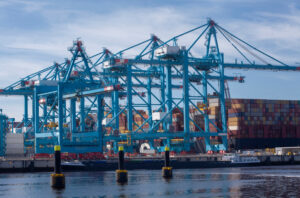The immediate impact of Russia’s invasion of Ukraine on the world economy and container shipping is so far fairly small, but that could change quickly, analysts at Drewry have said.
In a market update, Simon Heaney, Senior Manager of Container Research, said the fallout of the invasion for container shipping “will likely take longer to materialise” and the immediate operational threat is relatively low outside of the locality.
“Retaliatory cyber-attacks that might affect shipping and fast-rising fuel costs are probably the main concerns [on containers] right now,” Heaney continued.
Greater connectivity between ports and supply chains means that cyber risk is at an all-time high. Ukrainian networks have already suffered cyber-attacks and ports and logistics chains could be a viable target.
2022 has already seen a concerning number of cyber-attacks on ports and terminals. In January a cyber-attack hit major European ports including Rotterdam and Antwerp. Just this week a ransomware attack has caused a full system outage at one of the container terminals at Jawaharlal Nehru Port Trust (JNPT) in India.
Shipping will avoid the Black Sea for the foreseeable future, Drewry noted.
There were only three inter-continental services – on the major trades that Drewry tracks – calling at ports in the region. Immediate disruption to international liner networks will not be catastrophic, the analysts forecasted.
The outlook for container shipping remains “intrinsically tied” to the global economy, Heaney wrote, and further conflict – though currently a very low probability – could lead to an inflation-racked economy leading to a potential contraction in container demand.
“It is within the realms of possibility that a trade slowdown will be steep enough to release some of the pressure on the container supply chain, giving ports the necessary breathing space to break out of the congestion cycle. War would be far too high a price to pay for that cure,” Heaney wrote.









